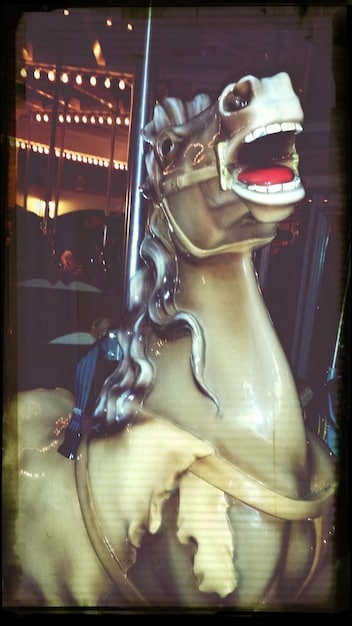The Art of the Quote: 10 Unforgettable Cult Classic Movie Lines

The art of the quote from cult classics lies in their ability to resonate deeply, encapsulating themes and emotions that linger long after the credits roll. These lines become cultural touchstones, sparking conversations and defining the films they inhabit.
The Art of the Quote: 10 Most Memorable Lines from Cult Classics and Their Impact extends far beyond the screen, embedding themselves into our cultural lexicon. These aren’t just lines; they’re concise reflections of the human condition, delivered with style and substance.
The Power of a Well-Crafted Line
A single, well-delivered line can transform a movie from a simple viewing experience into a cultural phenomenon. These memorable quotes often transcend the film itself, becoming ingrained in our everyday language and thought.
Cult classic quotes hold a special kind of power. They resonate with audiences on a deeper level, reflecting unconventional themes and raw emotions that mainstream films might shy away from. It’s their unique perspective that makes them so unforgettable.
Why Cult Classics Thrive on Memorable Quotes
There are several reasons why cult classics often produce such iconic lines. It’s not just about luck; it’s a combination of factors:
- Unique Storytelling: Cult films often break from traditional narrative structures, exploring unconventional themes that naturally lead to more striking and memorable dialogue.
- Character Depth: The characters in cult classics are typically more complex and flawed, making their words feel more authentic and relatable.
- Word-of-Mouth: Because cult classics often gain popularity through word-of-mouth, memorable lines act as a kind of shorthand, instantly recognizable to fans.
Ultimately, the power of a well-crafted line lies in its ability to capture the essence of a complex idea or emotion in a concise and impactful way. Cult classics, with their penchant for the unconventional, often excel at this art.
“I’m Gonna Make Him an Offer He Can’t Refuse” – The Godfather (1972)
This chilling line, delivered with quiet menace by Marlon Brando as Don Corleone, is synonymous with power and intimidation.
“I’m Gonna Make Him an Offer He Can’t Refuse” isn’t just a threat; it’s a declaration of absolute authority. It carries the weight of the Corleone family’s influence and serves as a constant reminder of the consequences of crossing them.

The Lasting Legacy
The line’s enduring popularity speaks to its effectiveness as a shorthand for irresistible pressure. It has been parodied, referenced, and adapted countless times in popular culture, solidifying its place in the collective consciousness.
- Enduring Catchphrase: The quote has become a ubiquitous phrase in everyday language, used to describe situations where someone is presented with an offer that is too good to pass up.
- Parodies and References: The line has been parodied in numerous films, TV shows, and commercials, demonstrating its widespread recognition.
- Cultural Impact: The quote has shaped the way we perceive power dynamics and negotiation tactics in both fictional and real-world scenarios.
Beyond its literal meaning, “I’m Gonna Make Him an Offer He Can’t Refuse” embodies the seductive and dangerous allure of unchecked power.
“Here’s Johnny!” – The Shining (1980)
Jack Nicholson’s maniacal grin and this seemingly innocuous phrase have become permanently etched in horror movie history.
While the phrase itself is simple, its delivery is what makes it so terrifying. The sheer unpredictability and violence that follows transformed the line into a harbinger of doom.
Why This Line So Effectively Scares Us
The line’s effectiveness is rooted in the psychological impact it has on the viewer. It plays on our deepest fears:
- Loss of Control: The quote is spoken by a character who has completely lost control, embodying the terror of slipping into madness.
- Unpredictability: The delivery is so unexpected and jarring that it instantly puts the audience on edge, creating a sense of unease and dread.
- Violation of Privacy: The act of breaking through the door is a violation of personal space, amplifying the feeling of vulnerability and helplessness.
“Here’s Johnny!” isn’t just a jump scare; it’s a chilling exploration of the human psyche descending into madness.
“Say ‘Hello’ to My Little Friend!” – Scarface (1983)
Al Pacino’s Tony Montana, fueled by cocaine and paranoia, unleashes this iconic line just before unleashing a hail of gunfire.
This line is a pure expression of unrestrained aggression and ego. It embodies the excess and violence that define Tony Montana’s rise and ultimate downfall.
The Quote as a Symbol of Excess
The quote has transcended its origins to become a symbol of unchecked ambition and the dangers of power. It represents:
- Unrestrained Power: The line encapsulates the feeling of invincibility that comes with wielding immense power, even if that power is ultimately destructive.
- Materialism and Greed: The quote is often associated with the pursuit of wealth and status, highlighting the corrupting influence of materialism.
- Self-Destruction: The line foreshadows Tony Montana’s inevitable demise, a consequence of his own hubris and violence.
“Say ‘Hello’ to My Little Friend!” is a cautionary tale about the seductive and destructive nature of power without responsibility.
“I See Dead People” – The Sixth Sense (1999)
This simple yet haunting declaration, uttered by a young Haley Joel Osment, redefined the supernatural thriller genre.
“I See Dead People” isn’t just a plot point; it’s an articulation of a profound and unsettling truth, delivered with heartbreaking innocence.

The Line’s Enduring Impact
The line’s effectiveness lies in its subtle yet powerful impact on the audience. It evokes:
- Suspense and Mystery: The quote immediately establishes a sense of unease and intrigue, drawing the viewer into the film’s supernatural world.
- Emotional Connection: The line is delivered with such vulnerability that it creates a strong emotional connection between the audience and the young protagonist.
- Philosophical Depth: The quote raises questions about the nature of reality and the possibility of life beyond death.
“I See Dead People” is more than just a scary line; it’s a gateway to exploring the complexities of grief, fear, and the unseen world.
“Nobody Puts Baby in a Corner” – Dirty Dancing (1987)
Patrick Swayze’s declaration of love and defiance in “Dirty Dancing” became an anthem for standing up for what you believe in.
This line transcends the romance genre, resonating with anyone who has ever felt marginalized or underestimated. It is a powerful statement of self-worth and a refusal to be silenced.
The Power of Self-Assertion
“Nobody Puts Baby in a Corner” is more than just a romantic declaration; it’s a statement about:
- Standing Up for Yourself: The quote encourages viewers to assert themselves and refuse to be treated unfairly.
- Breaking Free from Expectations: The line challenges societal norms and expectations, particularly for young women.
- Finding Your Voice: The quote empowers individuals to find their voice and speak their truth, regardless of the consequences.
It’s a testament to the power of believing in yourself and finding strength in vulnerability.
“May the Force Be With You” – Star Wars (1977)
This iconic phrase from “Star Wars” has become a universal expression of hope, encouragement, and solidarity.
“May the Force Be With You” is more than just a blessing; it’s a rallying cry for good against evil, faith against despair.
The Force as a Symbol
The phrase has resonated across cultures because it embodies a universal yearning for:
- Hope and Inspiration: The quote encapsulates the hope for positive outcomes and strength in challenging times.
- Inner Strength: It represents the ability to tap into inner resources and overcome obstacles.
- Unity and Solidarity: The phrase conveys a sense of shared purpose and support among individuals.
It is a constant reminder that even in the darkest of times, there is always hope for a brighter future.
“Go Ahead, Make My Day” – Sudden Impact (1983)
Clint Eastwood’s Dirty Harry delivers this taunt with a trademark snarl, daring criminals to cross him.
This line is a raw distillation of Eastwood’s persona: unflinching, uncompromising, and ready to deliver swift justice.
The Quote as a Challenge
The quote’s impact lies not just in its delivery, but in its subtext. It represents:
- Defiance and Fearlessness: The line challenges the antagonist to act, demonstrating a lack of fear.
- Unwavering Authority: The quote establishes the character’s position and readiness to impose justice.
- Justice and Consequences: It is a clear warning of the repercussions that will follow if the challenge is accepted.
It’s a potent reminder of the power of standing your ground, even in the face of overwhelming odds.
“I’m King of the World!” – Titanic (1997)
Leonardo DiCaprio’s Jack Dawson, standing on the bow of the Titanic, exuberantly declares his joy to the world.
“I’m King of the World!” is a celebratory expression of freedom and possibility, capturing the exhilaration of youth and new beginnings.
The Quote as an Expression of Optimism
This line encapsulates the boundless optimism and potential that many people feel when they are young and full of hope. It’s a powerful reminder of:
- Freedom and Opportunity: The quote speaks to the sense of limitless possibility that comes with youth and new experiences.
- Joy and Exuberance: The line captures the pure and unadulterated joy of living in the moment.
- Hope and Optimism: It conveys a sense of hope for the future and a belief in the power of dreams.
It’s a celebration of life in all its messy and unpredictable glory.
“Houston, We Have a Problem” – Apollo 13 (1995)
This understated yet chilling declaration from the crew of Apollo 13 became synonymous with facing insurmountable odds with calm resolve.
“Houston, We Have a Problem” is a study in stoicism under pressure, embodying the unwavering spirit of exploration and the importance of teamwork in the face of disaster.
The Power of Understatement
The phrase endures due to its calm depiction of crisis management, symbolising:
- Calm Under Pressure: It embodies the value of remaining composed in emergency situations.
- Professionalism: The quote reflects a high level of expertise and dedication to duty.
- Teamwork: It highlights the significance of teamwork and cooperation when confronting great challenges.
It is a testament to the power of human ingenuity and resilience in the face of adversity.
“Hasta la Vista, Baby” – Terminator 2: Judgment Day (1991)
Arnold Schwarzenegger’s Terminator delivers this iconic line with a smirk before dispatching a villain, cementing its place in action movie history.
“Hasta la Vista, Baby” is a memorable blend of futuristic threat and humorous catchphrase, becoming a defining characteristic of the Terminator character.
Lingering Cultural Impact
The line’s success is due to its combination of menace and pop culture appeal. It signifies:
- Strength of Character: It captures an unyielding attitude toward enemies.
- Contemporary Appeal: The phrase integrated itself into youth culture.
- Entertainment Value: The expression lightens the tense action of the movie.
It remains a symbol of cinematic action blended with unforgettable quips.
| Key Point | Brief Description |
|---|---|
| 🎬 Iconic Quotes | Memorable lines enhance a film’s impact and cultural presence. |
| 🎭 Character Essence | Quotes often encapsulate characters’ personalities and motivations. |
| 🌟 Cultural Impact | Lines become part of cultural vernacular, influencing language and thought. |
| 💥 Emotional Resonance | Quotes can evoke strong emotions and connect with audiences deeply. |
Frequently Asked Questions
▼
Movie quotes become popular because they resonate with audiences, encapsulating universal themes, emotions, or ideas in a concise and memorable way. They also spread through cultural references and media.
▼
Impactful quotes can significantly boost a film’s success by increasing memorability, driving word-of-mouth marketing, and becoming cultural touchstones. They help films stay relevant longer and attract new audiences.
▼
Cult classic quotes typically emerge from films with unique or unconventional themes, often resonating with niche audiences. These lines challenge norms, offer fresh perspectives, and become rallying cries for fans.
▼
Yes, a single quote can profoundly alter a film’s interpretation by highlighting key themes, revealing character depths, and prompting viewers to reconsider the narrative’s broader implications. It can shift perspective and enhance understanding.
▼
Filmmakers craft memorable dialogues by understanding audience psychology, weaving in universal emotions, and ensuring lines integrate seamlessly with character and plot. Repetition, rhythm, and context enhance their impact and memorability.
Conclusion
In conclusion, the art of the quote is a powerful tool in cinema, capable of shaping our understanding, emotions, and memories associated with cult classic films. These lines transcend their original context, becoming ingrained in our culture and language, and continuing to inspire and resonate with audiences across generations.





